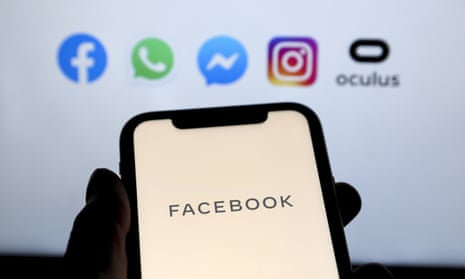The US government and a coalition of 48 states and districts have filed parallel lawsuits against Facebook in a major antitrust offensive that accused the social media behemoth of anticompetitive behavior and could ultimately force its breakup.
At the heart of both antitrust actions, announced on Wednesday, is Facebook’s dominance of the social media landscape, and whether the company gobbled up potential competitors and blocked market access to others that could have eaten into its staggering market share.
One lawsuit brings together nearly every state in the US, a coalition led by New York’s attorney general, Letitia James. The suit accuses Facebook of abusing its market power to quash smaller competitors.
“For nearly a decade, Facebook has used its dominance and monopoly power to crush smaller rivals and snuff out competition, all at the expense of everyday users,” said James in a statement. “Today, we are taking action to stand up for the millions of consumers and many small businesses that have been harmed by Facebook’s illegal behavior. Instead of competing on the merits, Facebook used its power to suppress competition so it could take advantage of users and make billions by converting personal data into a cash cow.”
The US Federal Trade Commission (FTC), which collaborated with the attorneys general in a years-long investigation, launched its own suit alleging that Facebook engaged in a “systematic strategy” of anticompetitive conduct. The FTC is seeking a permanent injunction in federal court that could force Facebook to sell off Instagram and WhatsApp.
“Facebook’s actions to entrench and maintain its monopoly deny consumers the benefits of competition,” Ian Conner, director of the FTC’s bureau of competition, said in a statement. “Our aim is to roll back Facebook’s anticompetitive conduct and restore competition so that innovation and free competition can thrive.”
Facebook generated revenues of more than $70bn and profits above $18.5bn in just the last year, according to the FTC’s complaint, and regulators allege that anticompetitive actions taken by the company’s executives, including Mark Zuckberg, gave them a monopoly in the market.
Investigators spent months looking into Facebook’s acquisition of two big apps in particular: a $1bn deal to buy the photo-sharing app Instagram in 2012, and the $19bn purchase of the global messaging service WhatsApp in 2014. Together, the buys brought the top four social media companies worldwide under Facebook’s control.
The FTC cleared Facebook for the acquisitions when they occurred, and the company is hoping to leverage those approvals in mounting a defense. Facebook executives are also arguing that their company has helped the apps grow.
“This is revisionist history,” said Facebook’s vice-president and general counsel, Jennifer Newstead, in a statement provided to the Guardian. “The government now wants a do-over, sending a chilling warning to American business that no sale is ever final. People and small businesses don’t choose to use Facebook’s free services and advertising because they have to, they use them because our apps and services deliver the most value. We are going to vigorously defend people’s ability to continue making that choice.”
But Facebook has come under greater scrutiny since the deals were done, and the FTC launched a new investigation into the potential antitrust violations in 2019.
In one 2012 email, made public through a separate investigation by the US House judiciary subcommittee, Zuckerberg highlighted how Instagram had an edge on mobile, an area where Facebook was falling behind. In another, the CEO said Instagram could hurt Facebook even if it did not become huge.

“The businesses are nascent but the networks are established, the brands are already meaningful and if they grow to a large scale they could be disruptive to us,” Zuckerberg wrote. Instagram’s co-founder also fretted that his company might be targeted for destruction by Zuckerberg if he refused the deal.
At the time of its acquisition, Instagram had 30 million users, and, even though it was growing rapidly, it wasn’t yet making money. WhatsApp boasted more than 450 million monthly active users when it was acquired. “WhatsApp is on a path to connect 1 billion people,” Zuckerberg said in a statement at the time.
Along with the acquisitions, the suits allege that for years Facebook created unfair conditions for third-party software developers that sought access to its platform, when those developers had the potential to develop tools that could compete with Facebook’s offerings.
If successful, the suits would require Facebook to open its platform to software developers, as well as divest from apps that have given it such vast market control. The company would also need approval for any future mergers or acquisitions.
In May, Facebook took over Giphy, a hugely popular moving-image app, with plans to integrate it with Instagram. Late last month, the company also announced plans to acquire Kustomer, an e-commerce app.
The FTC voted 3-2 to proceed with the injunction, which was filed in US district court for the District of Columbia.
Facebook is not the only big tech player to face antitrust action. In October, the US Department of Justice brought charges against Google, alleging monopolistic behavior. The efforts represent a turning of the tide as Washington and public opinion sours on big tech, which has so far enjoyed exponential growth and an almost unobstructed rise to power.
Agencies contributed reporting
